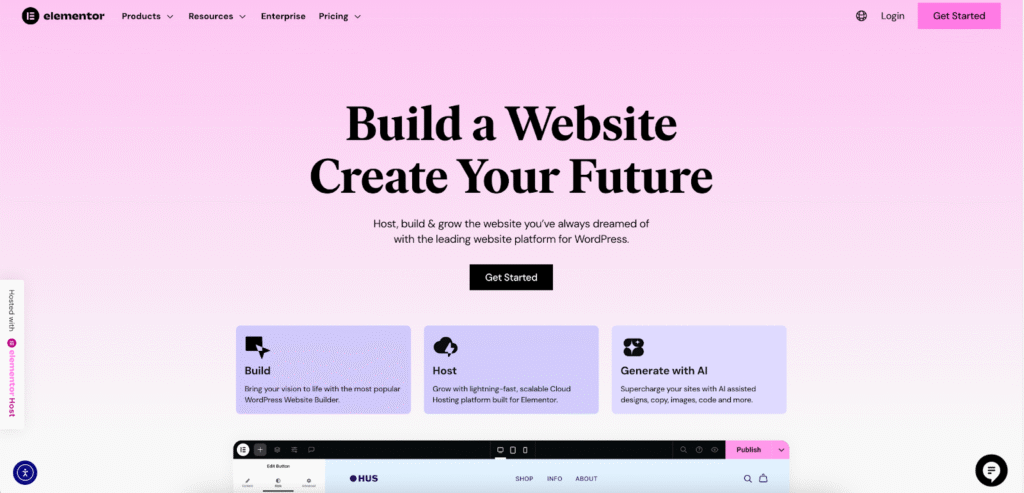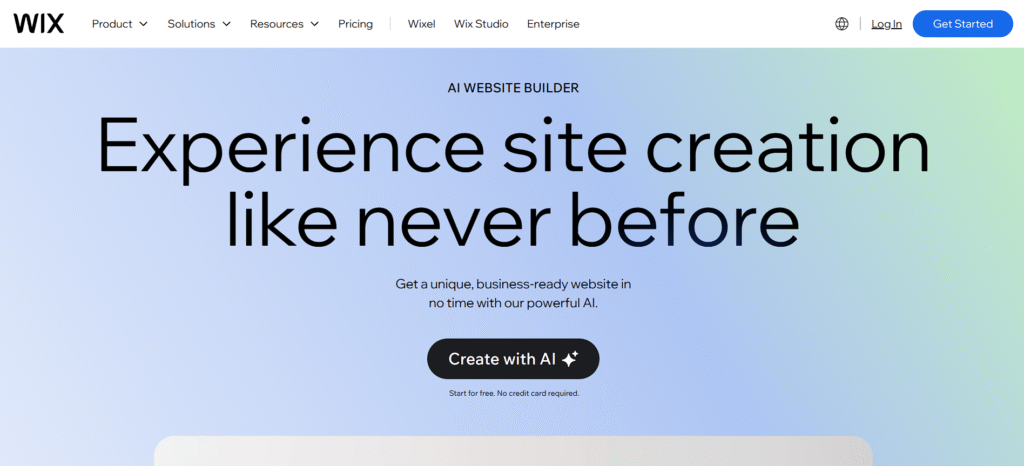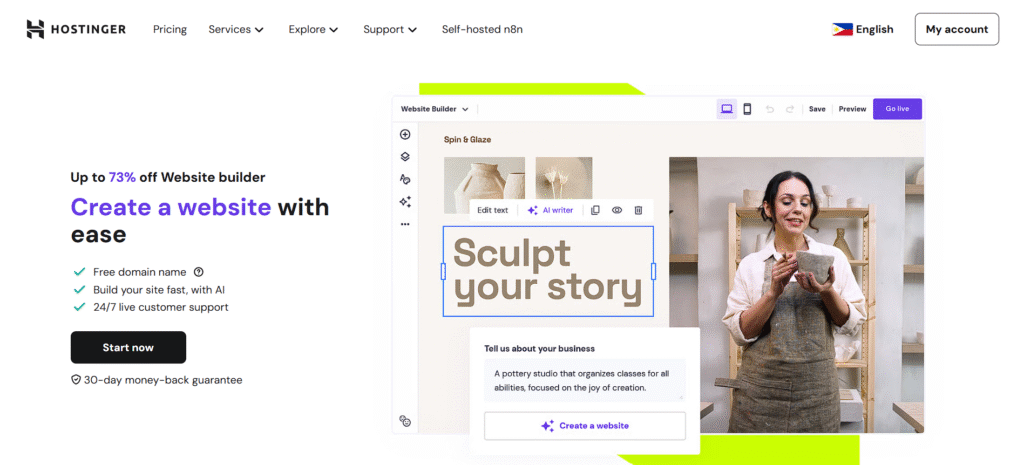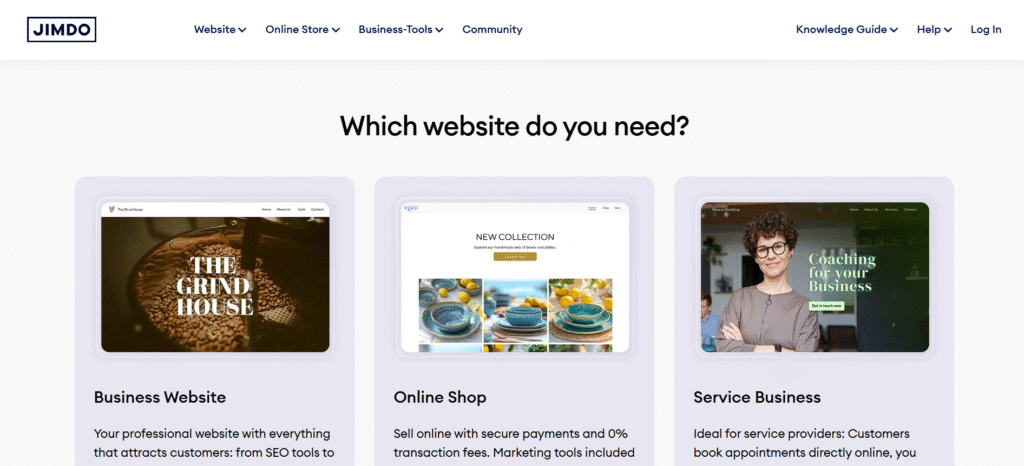Table of Contents
Choosing a website builder is a foundational business decision. Your choice impacts not just aesthetics, but also site speed, structure, and content flexibility, all of which are cornerstones of high-performing SEO. This article dives deep into the world of AI-powered web creation to determine which platform provides the most robust foundation for ranking on search engines and driving meaningful traffic to your site.
Key Takeaways
- Modern SEO is a Multifaceted Discipline: Success in search rankings goes far beyond keywords. It requires a holistic approach that balances technical health, high-quality content, site performance (Core Web Vitals), and an excellent user experience.
- Flexibility is the Foundation of Advanced SEO: While all-in-one builders offer simplicity, the combination of WordPress and a powerful builder platform like Elementor provides unparalleled control and flexibility, which is essential for competitive SEO strategies.
- AI is a Powerful Accelerator, Not a Replacement for Strategy: AI tools are incredibly effective for generating content drafts, creating unique images, and even writing code. However, they work best when guided by a clear human strategy to ensure originality, quality, and alignment with brand voice.
- Performance is Not Optional for SEO: A builder’s true SEO potential is tied to its performance capabilities. Look for solutions that offer integrated, high-performance hosting, automatic image optimization, and clean code to ensure fast loading times.
- Integration is the Key to an Efficient AI Workflow: The most effective AI website builder is one where the AI is not a separate tool but a deeply integrated part of the creation process. Elementor’s AI is contextually aware within its editor, creating a seamless workflow from planning and content creation to final design touches.
Understanding the Pillars of Modern SEO
Before we can evaluate any AI builder, we must first understand what search engines like Google are looking for. SEO is no longer about stuffing pages with keywords or building spammy links. Today, it’s about providing the best possible answer and experience for the user. This is built on several key pillars.
Technical SEO: The Unseen Foundation
Technical SEO refers to the optimizations that help search engine spiders crawl and index your site more effectively. If search engines can’t properly access and understand your content, it doesn’t matter how good that content is.
- Crawlability and Indexability: Your website builder must automatically generate clean XML sitemaps and give you control over your robots.txt file. This is the basic roadmap you provide to search engines.
- Site Speed and Core Web Vitals: Google uses a set of metrics called Core Web Vitals to measure the user experience of a webpage. These metrics (Largest Contentful Paint, First Input Delay, and Cumulative Layout Shift) are heavily influenced by your hosting environment, image sizes, and the efficiency of your website’s code. A fast-loading site is critical for both rankings and user satisfaction.
- Mobile-First Design: The majority of web traffic now comes from mobile devices, and Google primarily uses the mobile version of a site for indexing and ranking. An AI builder must produce designs that are fully responsive and look perfect on any screen size, giving the creator granular control over mobile, tablet, and desktop layouts.
- Secure Foundation (HTTPS): Your website must be served over HTTPS. This is a non-negotiable security standard and a confirmed ranking signal. All reputable builders and hosting providers include this by default.
- Structured Data (Schema Markup): This is a specific type of code that helps search engines understand the context of your content. For example, schema can tell Google that a piece of content is a recipe, a review, or a product, which can lead to enhanced search results (rich snippets).
On-Page SEO: Content and Structure
On-page SEO involves optimizing the actual content and HTML source code of a page. This is where you directly address the user’s search query.
- High-Quality, Relevant Content: This is the most important ranking factor. Your content must be comprehensive, accurate, and valuable to your target audience. AI can be a tremendous help in drafting this content, but it requires human oversight to ensure quality and originality.
- Keyword Strategy: You need the ability to easily edit key HTML elements like title tags, meta descriptions, and headings (H1, H2, H3). These elements help signal the page’s topic to both users and search engines.
- Clean URL Structure: Your URLs should be simple, readable, and include relevant keywords (e.g., yourdomain.com/blog/what-is-seo instead of yourdomain.com/p?123).
- Internal Linking: A logical internal linking structure helps users navigate your site and helps search engines understand the relationship between your pages, distributing authority throughout your site.
User Experience (UX): Putting the User First
Ultimately, Google wants to rank websites that users love. User experience signals, such as how long a visitor stays on your site (dwell time) or whether they leave immediately (bounce rate), are indirect indicators of your site’s quality. Good UX is a product of intuitive navigation, clean design, and accessibility for all users. An AI builder should not just create a site that looks good, but one that is easy and enjoyable to use.
The Role of AI in Website Creation and SEO
Now, let’s connect the dots. How do the features of an AI website builder specifically contribute to these SEO pillars? The role of AI is to act as a co-pilot, accelerating and enhancing the creation process in several key areas.
AI for Content Generation
This is the most obvious application. AI can take a prompt and generate entire articles, product descriptions, or landing page copy.
- SEO Benefit: This dramatically speeds up content production, helping you build out your site and blog with relevant information. AI can also generate multiple variations of meta titles and descriptions for A/B testing or to better target specific keywords.
- The Caveat: AI-generated content can sometimes be generic or lack the unique perspective that makes content truly authoritative. It is crucial to use AI as a starting point, a tool to overcome writer’s block, and then have a human expert edit, fact-check, and inject brand personality.
AI for Image Creation and Optimization
Unique, high-quality images make your content more engaging and can rank in Google Image Search.
- SEO Benefit: AI image generators allow you to create completely original visuals, moving away from generic stock photos. More advanced AI tools can also automatically write descriptive alt text for your images. Alt text is crucial for accessibility and helps search engines understand what an image is about.
- The Connection: This feature is most powerful when paired with an integrated image optimization tool. Creating a beautiful AI image is only half the battle; it must be compressed and served in a next-gen format (like WebP) to avoid slowing down your site.
AI for Code and Structure
For those looking for deeper customization, AI can be a powerful assistant for technical tasks.
- SEO Benefit: An AI code assistant can generate custom CSS for unique styling or, more importantly for SEO, generate structured data (schema markup) in the correct JSON-LD format. This can make your pages eligible for rich snippets in search results, significantly improving click-through rates.
- AI Site Planners: Before a single page is designed, some AI tools can generate a complete sitemap and wireframe for your website based on a description of your business. This helps ensure a logical site architecture from the very beginning, which is fantastic for both user navigation and search engine crawling.
Evaluating the Top AI Website Builders for SEO
With a clear understanding of SEO principles and the role of AI, we can now evaluate the leading platforms. We’ll analyze them based on their control over technical and on-page SEO, their performance capabilities, and the integration of their AI features.
The WordPress + Elementor AI Approach (The Professional’s Choice)

This isn’t a single, closed builder but a combination of the world’s most dominant Content Management System (CMS), WordPress, with a comprehensive website builder platform, Elementor. This approach is favored by professionals for its unparalleled flexibility and control.
- Core Strength: It leverages the robust, open-source foundation of WordPress, which is inherently SEO-friendly, and supercharges it with an advanced visual builder and a suite of integrated tools. You get the best of both worlds: the power of a full-fledged CMS and the ease of a drag-and-drop interface.
- Technical SEO Control: With WordPress, you have 100% control over every technical SEO element. You can easily integrate industry-standard plugins like Yoast SEO or Rank Math to manage sitemaps, schema markup, and detailed on-page analysis. Elementor itself produces clean, semantic code and offers granular responsive controls to perfect your mobile design.
- Performance: This is a key differentiator. Unlike closed platforms where you’re stuck with their hosting, the Elementor ecosystem offers dedicated performance solutions. Elementor Hosting is a managed WordPress hosting service built on the Google Cloud Platform and integrated with Cloudflare’s Enterprise CDN. It’s specifically engineered and optimized for Elementor websites, ensuring top-tier speed and security that directly impacts Core Web Vitals. Furthermore, the Image Optimizer plugin automatically compresses images and converts them to next-gen formats, tackling one of the biggest causes of slow websites.
- AI Integration: This is where the Elementor platform truly shines. The Elementor AI tools are not bolted on; they are deeply and contextually integrated inside the editor. When you’re editing a heading, the AI offers to write headlines. When you’re working with an image widget, it offers to generate or refine images. This seamless workflow is incredibly efficient. It begins with the AI Site Planner, a free tool that generates a full sitemap and wireframe, giving you a strategic blueprint before you even open the editor. This creates a cohesive workflow from initial concept to a fully realized, content-rich website.
- Extensibility and Scalability: The WordPress ecosystem has tens of thousands of plugins to meet any conceivable SEO need, from advanced schema to broken link checkers. For businesses looking to sell online, Elementor’s WooCommerce Builder provides complete design control over your eCommerce store, allowing you to create an SEO-optimized shopping experience.
“For professionals who require complete control over the SEO destiny of a website, the combination of WordPress and the Elementor platform is unmatched,” notes web development expert Itamar Haim. “You have the open-source freedom of WordPress to handle any advanced technical SEO task, paired with a unified platform in Elementor that provides optimized hosting, performance tools, and a deeply integrated AI workflow. It’s the most scalable solution for long-term growth.”
Wix ADI (Artificial Design Intelligence)

Wix is one of the most popular all-in-one website builders, and its ADI feature aims to automate the initial design process.
- Core Strength: Simplicity and speed for beginners. Wix ADI asks a series of questions and then generates a website for you in minutes. It’s a fully hosted, self-contained solution.
- Technical SEO Control: Wix provides a suite of built-in SEO tools, often referred to as the “Wix SEO Wiz,” which guides users through basic optimizations. It handles technical basics like sitemaps and SSL automatically. However, the level of control is significantly less granular than WordPress. While you can edit titles, metas, and URLs, you have limited access to the underlying code, server configurations, or advanced schema implementation.
- Performance: As a closed SaaS platform, performance is managed entirely by Wix. While generally adequate for simple sites, users have very few levers to pull to optimize for Core Web Vitals beyond basic image compression. You cannot choose your hosting provider or implement advanced caching strategies.
- AI Integration: The AI is primarily focused on the initial site generation. It builds the first draft of your site. While there are also AI tools for content, the experience is less of a real-time, in-editor creative partner and more of an initial setup assistant.
- Extensibility: You are limited to the apps available in the Wix App Market. While there are many good options, it’s a fraction of the size and scope of the WordPress plugin repository.
Hostinger Website Builder (formerly Zyro)

Hostinger is known for its affordable hosting plans and has integrated a beginner-friendly website builder with a number of AI tools.
- Core Strength: It’s an affordable, all-in-one solution that is very easy for absolute beginners to get started with.
- Technical SEO Control: Similar to Wix, Hostinger’s builder offers a simplified set of SEO tools. You can manage on-page elements like titles and descriptions. It handles the technical backend for you, but this comes at the cost of control. Advanced configurations are not possible.
- Performance: Performance is managed within the Hostinger environment. It’s generally good for the price point but doesn’t offer the high-performance architecture of a solution like Elementor Hosting on Google Cloud.
- AI Integration: Hostinger offers a set of distinct AI tools: an AI Writer, an AI Logo Maker, and even an AI Heatmap to predict where users will focus their attention. These tools are useful but function more as separate utilities rather than a single, seamless workflow integrated directly into the page building experience.
- Extensibility: As a closed platform, there is very little room for extension beyond the features offered by Hostinger.
Jimdo Dolphin

Jimdo is another player in the AI-assisted website creation space, with its “Dolphin” editor designed for maximum speed and simplicity.
- Core Strength: It is arguably one of the fastest ways to get a basic business website online. It asks you a few questions, pulls information from your existing Google My Business or social media profiles, and generates a site in about three minutes.
- Technical SEO Control: The SEO controls are extremely basic and automated. This is great for someone who wants to think about SEO as little as possible, but it’s a significant limitation for anyone trying to compete in a crowded market.
- Performance: Performance is managed by Jimdo and is optimized for its simple, structured sites.
- AI Integration: The AI is almost entirely focused on the initial, automated setup. It’s less of a design tool and more of an information aggregator that builds a standard site layout for you.
- Extensibility: The platform is very limited in terms of adding custom features or integrations.
Comparative Analysis: Which Builder Wins for SEO?
After reviewing the options, a clear hierarchy emerges based on the user’s SEO goals and technical comfort level.
For Beginners & Maximum Simplicity
For a small local business, a portfolio, or a personal project where SEO is not a primary competitive driver, the all-in-one builders like Wix ADI and Hostinger Website Builder are viable options. They handle the basic technical SEO heavy lifting automatically and guide users through the on-page fundamentals. The main trade-off is a lack of control and limited scalability for the future. You are building on rented land, and your ability to optimize is capped by the platform’s features.
For Long-Term Growth & Maximum SEO Control
For any business, publisher, or creator who is serious about using organic search as a primary growth channel, the answer is unequivocally the WordPress + Elementor combination.
SEO is a long-term, competitive marathon, not a sprint. Winning requires the ability to continuously adapt, optimize, and control every single aspect of your website. The open-source nature of WordPress provides the limitless foundation, while the Elementor platform provides the integrated toolset to execute a professional-grade strategy efficiently.
The Winning Combination Recap:
- Foundation: You are building on WordPress, the most powerful and SEO-friendly CMS on the planet. You own your data and your website completely.
- Control: You have granular control over every technical and on-page SEO element, either natively or through a vast ecosystem of specialized plugins.
- Performance: You have access to a dedicated, purpose-built ecosystem for speed, including Elementor Hosting and the Image Optimizer. You are not at the mercy of a generic, one-size-fits-all hosting environment.
- AI Workflow: You benefit from a truly integrated AI solution that accelerates the entire creation process, from strategic planning with the AI Site Planner to content and image generation directly within the editor.
- Ecosystem: You can tap into a limitless ecosystem of plugins and themes to meet any future business or SEO need. Your site can grow and evolve without constraints.
Conclusion
While many AI website builders can create a visually appealing website quickly, the “best for SEO” is the one that doesn’t treat SEO as an afterthought or a simple checklist. The best platform provides a foundation of technical excellence, complete creative control, and powerful tools that help you execute a winning strategy.
All-in-one builders are excellent for getting started, but their inherent limitations cap your long-term SEO potential. For those who want to build a durable, high-ranking digital asset, the choice is clear. The combination of WordPress’s open-source power and the Elementor platform’s fully integrated suite of creation, performance, and AI tools provides the control, flexibility, and scalability needed to compete and win in the ever-evolving landscape of search engine optimization.
Frequently Asked Questions (FAQ)
1. Can AI write all my website content for SEO? AI is an excellent tool for generating drafts, brainstorming ideas, and creating outlines. However, for the best SEO results, AI-generated content should always be reviewed, edited, and refined by a human. Search engines like Google prioritize content that demonstrates expertise, authoritativeness, and trustworthiness (E-A-T), which often requires a human touch and unique perspective.
2. Is WordPress good for SEO by default? WordPress provides a strong SEO foundation out of the box with features like clean permalink structures and easy content management. Its true power comes from its extensibility. When combined with a well-coded theme like Hello Theme, a powerful builder like Elementor, and an SEO plugin like Yoast or Rank Math, it becomes the most powerful platform for SEO customization.
3. How important is hosting for SEO? Hosting is critically important. Your hosting provider directly impacts your site speed, uptime, and security, all of which are important for SEO. A slow site leads to poor Core Web Vitals and a higher bounce rate. A solution like Elementor Hosting is specifically optimized for your builder, ensuring better performance than generic hosting options.
4. Do I need a separate SEO plugin if I use Elementor? Yes, it is highly recommended. Elementor is designed to work seamlessly with leading SEO plugins like Yoast and Rank Math. Elementor handles the design, layout, and content creation, while the SEO plugin provides a dedicated interface for managing technical and on-page details like meta tags, schema markup, and XML sitemaps. They are complementary tools.
5. Can I switch from a builder like Wix to Elementor later? Migrating from a closed platform like Wix to WordPress is possible, but it can be a complex and manual process. It often involves exporting your content and rebuilding the site’s design in Elementor. This is why choosing the right platform from the start is crucial for long-term growth, as it avoids a difficult migration down the road.
6. What are Core Web Vitals and why do they matter? Core Web Vitals are a set of three specific metrics Google uses to measure a page’s loading performance, interactivity, and visual stability. They are a confirmed ranking factor because they are a direct measure of user experience. A good score requires a combination of optimized hosting, efficient code, and compressed images.
7. Does using an AI website builder guarantee good SEO rankings? No. An AI website builder is a tool. While a good builder can provide you with the technical foundation and content creation speed needed for SEO, achieving high rankings still requires a solid strategy. This includes proper keyword research, creating high-quality content that meets user intent, and building your site’s authority over time.
8. How does Elementor’s accessibility tool, Ally, help with SEO? Web accessibility and SEO are closely linked because both are about providing a good experience for all users. The Ally by Elementor plugin helps you identify and fix accessibility issues. This makes your site more usable for people with disabilities, which can improve user engagement signals (like dwell time) and reduce bounce rates. Additionally, accessible design practices, like proper use of headings and alt text, are also SEO best practices.
9. Is Elementor AI free to use? Elementor offers a free plan for Elementor AI that includes a generous number of credits to get started with text and code generation. Image generation and more extensive use require a subscription. The AI Site Planner, which creates your initial website brief and wireframe, is completely free to use.
10. How can I get started with Elementor? You can start by installing the free version of the Elementor plugin on any WordPress website. This allows you to experience the power of the drag-and-drop editor and its core features. You can get started with the free download from their website.
Looking for fresh content?
By entering your email, you agree to receive Elementor emails, including marketing emails,
and agree to our Terms & Conditions and Privacy Policy.





